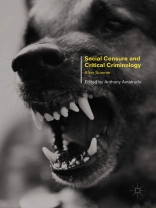This edited collection focuses on the sociology of ‘social censure’ – the sociological term advocated by Colin Sumner in his seminal writing of the 1980s and 1990s. Social censure has become increasingly important in contemporary criminological writing. This can especially be seen in recent writing on gender and race and also in terms of the way that the state’s relationship to crime is now understood. This collection addresses a deficit in the published literature and both revisits themes from an earlier era and looks forward to the development of new writing that develops Sumner’s seminal work on social censure. The contributors are drawn from leading scholars from across the Social Sciences and Law and they address a wide range of issues such as: race, youth justice, policing, welfare, and violence. The resulting volume is an interdisciplinary text which will be of special interest to scholars and students of Critical Criminology and Socio-Legal Studies, as well as those interestedin the operation of the criminal justice system and criminological theory.
Inhoudsopgave
1. Thinking Through Critical Criminology.- 2. Censure: Moral and Sociological.- 3. Restoring the Crime-Poverty – Class Inequality Link.- 4. Two Accounts of Censure.- 5. Anti-Racist Criminology?.- 6. The Social Censure of Hidden Youth in Hong Kong.- 7. Sex Work, Censure and Transgression.- 8. Mitigating and Responding to Corporate Violence: Beyond Crime and Criminology.- 9. Idealism, Violence and Censure.- 10. War and Peace: is Militarisation the New Norm?.- 11. What is Crime, What is Deviance? Reflections on the Development and Contemporary Relevance of Sumner’s Notion of Social Censure.- 12. Sensure? Public Art, Territorial Coding, and Censure.- 13. Normativity and the Ontology of Being.
Over de auteur
Dr Anthony Amatrudo is Associate Professor of Criminology at Middlesex University School of Law, UK.












